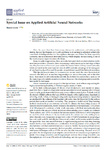Special Issue on Applied Artificial Neural Networks

Use this link to cite
http://hdl.handle.net/2183/32249Collections
- Investigación (FIC) [1728]
Metadata
Show full item recordTitle
Special Issue on Applied Artificial Neural NetworksAuthor(s)
Date
2022Citation
Gestal, M. Special Issue on Applied Artificial Neural Networks. Appl. Sci. 2022, 12, 9551. https://doi.org/10.3390/app12199551
Abstract
[Abstract]: Over the years there have been many attempts to understand, and subsequently imitate, the way that humans try to solve problems, so it can help to artificially achieve the same kind of intelligent behavior. Among these attempts, one of them has been especially successful: the artificial neural networks (ANNs), which simplify the functioning of one of the most complex organs in nature: the brain.
From its earliest approaches, these networks have provided excellent solutions in the most diverse fields of research. After overcoming a small hurdle in the last stage of their use, they have revived in recent years under the nomenclature of deep neural networks, which are based on the same bases of those of ANNs and take advantage of the emergence of new learning algorithms and the greater computational capabilities that exist nowadays.
This Special Issue is aimed to accommodate, on one hand, the latest theoretical advances in this field, such as new learning paradigms or new architectures, and on the other hand, those more recent works in the scientific field where the authors have used any of the many types of available neural networks or those new theorical proposals to reach the best results in their areas.
Eleven manuscripts were accepted in this Special Issue, most of them emphasizing the highly successful applicability of ANNs in a great variety of fields.
Keywords
Artifical Neural Networks (ANNs)
Learning paradigms
Architectures
Learning paradigms
Architectures
Editor version
Rights
Atribución 3.0 España © 2022 by the authors. Licensee MDPI, Basel, Switzerland. This article is an open access article distributed under the terms and conditions of the Creative Commons Attribution (CC BY) license (https://creativecommons.org/licenses/by/4.0/ ).
ISSN
2076-3417






